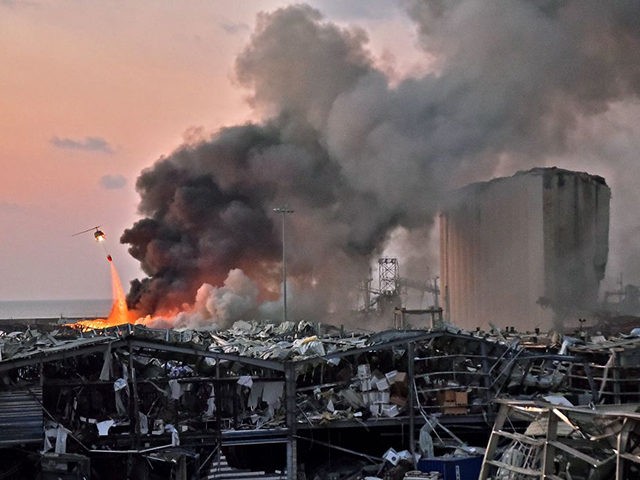A bombshell report published by Reuters on Tuesday revealed that senior Lebanese officials received warnings as recently as last month that a cache of highly combustible ammonium nitrate held at the Port of Beirut was a threat to its densely populated surroundings and should be moved.
The estimated 2,700 tons of ammonium nitrate exploded a week ago, obliterating the Port of Beirut and several blocks of the nation’s capital. While the death toll officially stands at 220 people, authorities believe the true number of dead under the rubble is much higher. Officials believe the explosion left hundreds of thousands of people homeless and destroyed 6,000 buildings.
In response to public outrage at the negligence believed to have caused the explosion, the entire Lebanese government — now-former Prime Minister Hassan Diab and all 20 cabinet members — resigned on Monday. Hezbollah ally and Lebanese President Michel Aoun remains in power.
Reuters claimed to have obtained documents showing the complaints from security officials about the ammonium nitrate at the port, confiscated from a suspect ship in 2013 and left with little supervision in an unsecured warehouse. Among the documents is a letter sent directly to Aoun and Diab on July 20.
“While the content of the letter was not in the report seen by Reuters, a senior security official said it summed up the findings of a judicial investigation launched in January which concluded the chemicals needed to be secured immediately,” Reuters reported.
The security official said he or she personally asserted the explosive materials could “destroy Beirut” if not moved. The top concern appeared not to be negligence, but theft by a terrorist organization, which could use the ammonium nitrate to create bombs.
Reuters published the report after Diab resigned, but managed to receive a quote from a representative of the former prime minister’s who claimed that Diab “acted on it” by forwarding the letter to the Supreme Defence Council, which did nothing with it.
“The current cabinet received the file 14 days prior to the explosion and acted on it in a matter of days. Previous administrations had over six years and did nothing,” the representative is quoted as saying.
No indications exist that the status of the ammonium nitrate changed between July 20 and August 4, when it exploded. Authorities have also not confirmed what caused the explosion at all. Lebanese media outlets have speculated that construction work caused an accidental fire near the materials, possible because construction crews would not be aware of the unlabeled combustibles while doing work.
Most officials have stated there is no evidence of foul play or terrorism involved in the matter. Aoun, one of the few still in power, did speculate that a “rocket or bomb” could have caused the explosion, but no video evidence shows any outside rocket coming in, nor have authorities made public any evidence of an explosive device at the site.
Like Diab, Aoun later also shifted blame to the Supreme Defence Council.
“(The state security service) said it is dangerous. I am not responsible! I don’t know where it was put and I didn’t know how dangerous it was. I have no authority to deal with the port directly. There is a hierarchy and all those who knew should have known their duties to do the necessary,” Aoun asserted, according to Reuters.
The Reuters report followed the revelation last week that authorities with the power to secure the ammonium nitrate received information about how unsafe it was at least six times between 2013 and the day of the explosion. The reports revealing this noted that no one acted on warnings about the nitrate, at least on record.
The question of which official had the power to secure the explosive material will be pivotal to the justice process in the case of the blast. Last week, Aoun’s government acted quickly to place every individual with authority over seizing and securing confiscated items at the Port of Beirut under house arrest if they worked in that capacity between 2014 and last week. The revelation, however, that Diab and Aoun were personally aware of the danger and, in the face of inaction from many of these officials, also redirected concerns may also result in them being held liable for the disaster.
Further evidence against Aoun is the fact that the Associated Press spoke to French volunteers helping with search and rescue operations in Beirut on Tuesday who said that even more dangerous material remains unsecured in the area.
“We noted the presence of containers with the chemical danger symbol. And then noted that one of the containers was leaking,” a French chemical expert identified as “Lt. Anthony” told the AP. His team identified over 20 containers carrying hazardous substances, the report detailed.
The stream of mass resignations from the Lebanese cabinet did not begin with the explosion. The morning before the blast, former Foreign Minister Nassif Hitti resigned in disgust, calling Lebanon under the current government a “failed state.” Before Diab announced that all 20 ministers were resigning, four others independently stepped down.
Diab issued a scathing goodbye speech against an undefined enemy.
“The magnitude of the tragedy is too large to describe; nevertheless, some live in another time; their only aim is to score political points, deliver populist electoral discourse, and demolish the lingering State’s presence,” Diab said. “I have previously said that the system of corruption is deeply-rooted in all the functions of the state; nevertheless I discovered that the corrupt system is bigger than the State, and that the latter is constrained by this system and cannot confront it or get rid of it.”

COMMENTS
Please let us know if you're having issues with commenting.